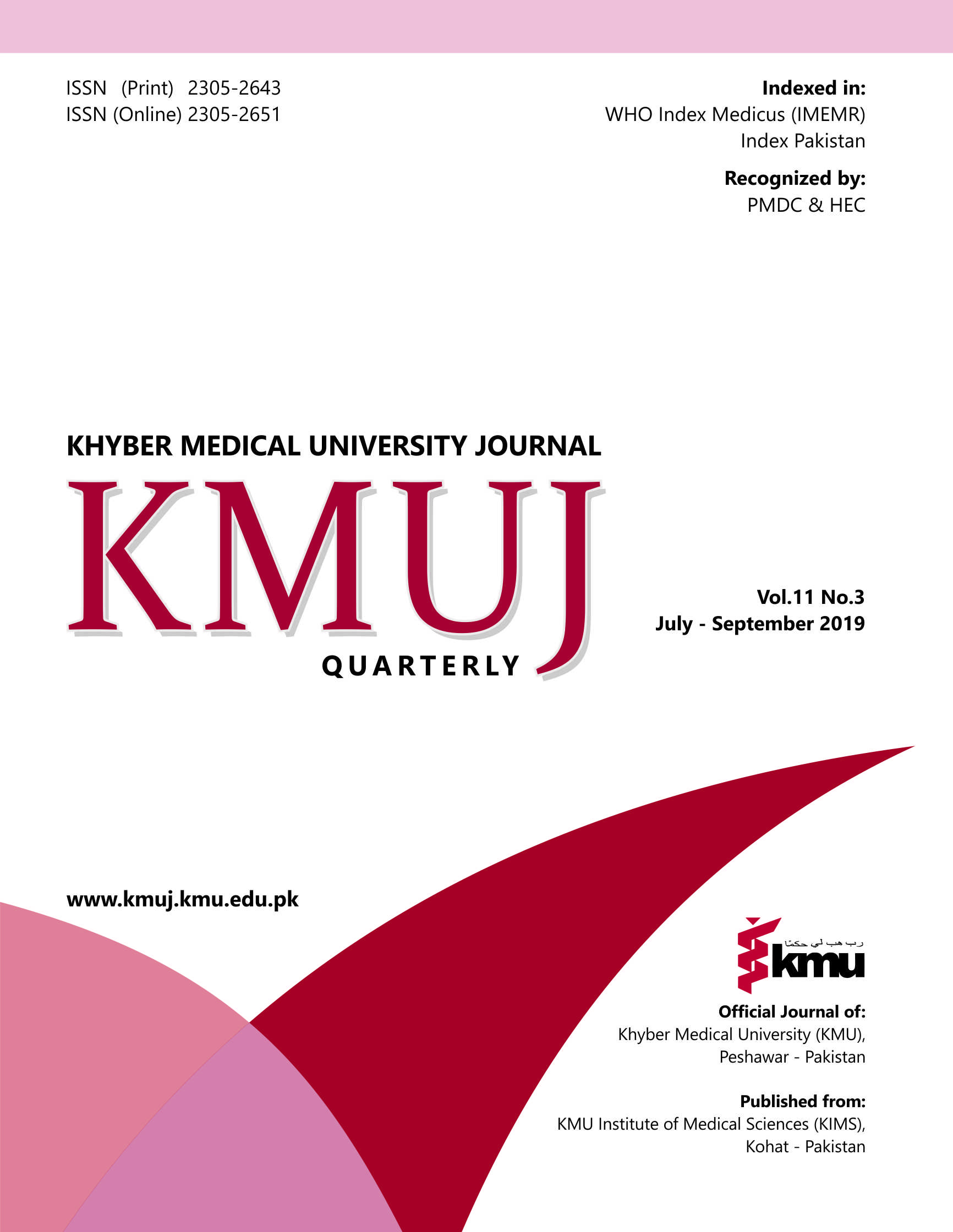CLINICAL PROFILE OF MULTIPLE MYELOMA IN A TERTIARY CARE HOSPITAL OF PESHAWAR, PAKISTAN
Main Article Content
Abstract
OBJECTIVE: To determine demographic and clinico-pathological characteristics of patients suffering from multiple myeloma (MM) in Peshawar, Pakistan.
METHODS: This descriptive, retrospective study was conducted at Pathology Department, Rehman Medical Institute, Peshawar, Pakistan from January 2006 to September 2018. Detailed information of forty patients diagnosed with MM was collected. World Health Organization (WHO) set criterion was utilized to diagnose MM. SPSS version 22 was used for Statistical analysis.
RESULTS: Out of 40 patients, 72.5% were males with M:F ratio of 2.63:1 and mean age of patients was 59.26±13.1 years. The common presenting complaints were body/bony pain (87.5%), fatigue (72.5%), body tenderness (45%) and backache (42.5%). Pallor was present in 33 (82.5%) patients. Laboratory studies showed mean hemoglobin level of 8.6±2.1 g/dl, anemia (92.5%), thrombocytopenia (27.5%) and hypercalcemia (17.5%). Elevated ESR (>100) was noted in 29 (72.5%) cases. Renal impairment was established in 35% of patients. Urinary Bence Jones protein was present in 13 (32.5%). Serum protein electrophoresis showed M band in 39 (97.5%) cases. Lytic lesions were detected in X-rays of 31 (77.5%) patients. Based on international staging system, nine (22.5%) cases were in stage I, 16 (40%) in stage II and 15 (37.5%) in stage III.
CONCLUSION: Majority of multiple myeloma patients in our study were in the 6th decade of life. Bone pain and fatigue were the most common presenting symptoms. Anemia and elevated ESR were the most common laboratory parameter. Most of the patients were diagnosed in later stages (stage II and III).
Article Details
Work published in KMUJ is licensed under a
Creative Commons Attribution 4.0 License
Authors are permitted and encouraged to post their work online (e.g., in institutional repositories or on their website) prior to and during the submission process, as it can lead to productive exchanges, as well as earlier and greater citation of published work.
(e.g., in institutional repositories or on their website) prior to and during the submission process, as it can lead to productive exchanges, as well as earlier and greater citation of published work.
References
Kyle RA, Gertz MA, Witzig TE, Lust JA, Lacy MQ, Dispenzieri A, et al. Review of 1027 patients with newly diagnosed multiple myeloma. Mayo Clin Proc 2003;78(1):21-33. DOI: 10.4065/78.1.21.
Wei A, Juneja S. Bone marrow immunohistology of plasma cell neoplasms. J Clin Pathol 2003;56(6):406-11. DOI: 10.1136/jcp.56.6.406
Rajkumar SV, Dimopoulos MA, Palumbo A, Blade J, Merlini G, Mateos MV, et al. International Myeloma Working Group updated criteria for the diagnosis of multiple myeloma. Lancet Oncol 2014 Nov 1;15(12):e538-48. DOI:10.1016/S1470-2045(14)70442-5.
Fousad C, Gangadharan KV, Abdulla MC, Naryan R, Ali MJ. Clinical profile of multiple myeloma in South India. Indian J Med Paediatr Oncol 2018;39(1):62-6. DOI: 10.4103/ijmpo.ijmpo_57_17.
Siegel RL, Miller KD, Jemal A. Cancer statistics (2018). CA Cancer J Clin 2018;68(1):7–30. DOI: 10.3322/caac.21442.
Sant M, Allemani C, Tereanu C, De-Angelis R, Capocaccia R, Visser O, et al. Incidence of hematologic malignancies in Europe by morphologic subtype: results of the HAEMACARE project. Blood 2010;116(19):3724-34. DOI: 10.1182/blood-2010-05-282632.
Global Burden of Disease Cancer Collaboration, Fitzmaurice C, Allen C, Barber RM, Barregard L, Bhutta ZA, et al. Global, regional, and national cancer incidence, mortality, years of life lost, years lived with disability, and disability-adjusted life-years for 32 cancer groups, 1990 to 2015: a systematic analysis for the global burden of disease study. JAMA Oncol 2017;3(4):524-48. DOI: 10.1001/jamaoncol.2016.5688.
Sultan S, Irfan SM, Parveen S, Ali H, Basharat M. Multiple Myeloma: A retrospective analysis of 61 patients from a tertiary care center. Asian Pac J Cancer Prev 2016;17(4):1833-5. DOI: 10.7314/apjcp.2016.17.4.1833.
Eriksson M, Karlsson M. Occupational and other environmental factors and multiple myeloma: a population based case-control study. Br J Ind Med 1992;49(2):95-103. DOI: 10.1136/oem.49.2.95.
Sultan S, Irfan SM, Parveen S, Taufiq U. International Scoring System in Symptomatic Multiple Myeloma: Experience from a Tertiary Care Center. Asian Pac J Cancer Prev 2016;17(4):2031-3. DOI: 10.7314/apjcp.2016.17.4.2031.
Sutandyo N, Firna E, Agustina J, Prayogo N, Widjaja L. Clinicopathology Profile and Bone Involvement of Multiple Myeloma Patients in Dharmais National Cancer Hospital, Indonesia. Asian Pac J Cancer Prev 2015;16(15):6261-5. DOI: 10.7314/apjcp.2015.16.15.6261.
Swerdlow SH, Campo E, Harris NL, Jaffe ES, Pileri SA, Stein H, et al. World Health Organization classification of tumours of haematopoietic and lymphoid tissues. 4th ed. Volume 2: World Health Organization; 2008.
Mansoor S, Siddiqui I, Adil S, Nabi Kakepoto G, Fatmi Z, Ghani F. Anion gap among patients of multiple myeloma and normal individuals. Clin Biochem 2007;40(3-4):226-9. DOI: 10.1016/j.clinbiochem.2006.10.011
Basit A, Siddiqui N, Hameed A, Muzaffar N, Athar S. Factors affecting outcome of patients with multiple myeloma. J Ayub Med Coll Abbottabad 2014;26(3):376-9.
Devi AA, Sharma TD, Singh YI, Sonia H. Clinicopathological profile of patients with non-hodgkin’s lymphoma at a regional cancer center in Northeast India. J Sci Soc 2017;44(3):140-4. DOI: 10.4103/jss.JSS_42_17.
Turesson I, Velez R, Kristinsson SY, Landgren O. Patterns of multiple myeloma during the past 5 decades: stable incidence rates for all age groups in the population but rapidly changing age distribution in the clinic. Mayo Clin Proc 2010;85(3):225-30. DOI: 10.4065/mcp.2009.0426.
Kaur P, Shah BS, Baja P. Multiple myelomas: a clinical and pathological profile. Gulf J Oncol 2014;1(16):14-20.
Winearls CG. Acute myeloma kidney. Kidney Int 1995;48(4):1347-61. DOI: 10.1038/ki.1995.421.
